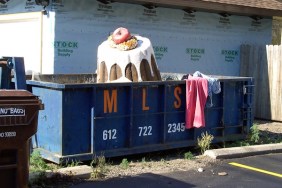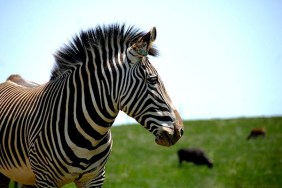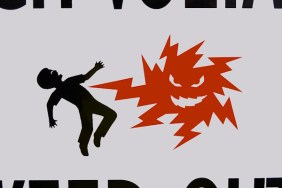Good on paper, bad in practice: from fart offsets to eco-beer, blocking the sun to Green Burning Man, here are 20 of the craziest innovations, inventions, and ideas to save the planet – most of which have fallen miserably short of the mark. In the modern green movement rush to solve our numerous environmental crises, scientists have been scrambling to develop innovative technologies and creative solutions. Some of these developments – from small-scale interventions like cargo container homes to citywide green urban re-designs – have been lauded for their ingenuity and potential. But other concepts, while initially offering promise, have turned out to be impossible, dangerous, or just…ridiculous.
Global warming. Food shortages and water scarcity. Fossil fuel depletion. Deforestation and extinction. Freakish weather. Methane pollution and acid rain. Dwindling resources. It’s an understatement to say we’re facing major environmental issues as the first decade of the 21st century draws to a close. No wonder scientists are trying anything and everything. Even things that don’t work. At all.
Artificial Islands and Floating Cities
(Images via wikipedia and Reuters)
Land reclamation project turned private playground for the rich and famous, artificial island projects such as Dubai’s The World have come under criticism for harming the environment and disturbing delicate ecosystems as developers claim the projects actually benefit the planet like natural islands. Despite the fact that self-professed environmentalists Brad and Angelina have snapped up their own faux islet, The World is an environmental embarrassment compared to contemporary architectural trends toward prefabrication, portability and the recycling of old structures into new houses.
Other artificial islands claiming to preserve the environment are credible, such as (where else?) the Bay Area’s Treasure Island project, China’s Dongtan, and the high-tech Lilypad – the amphibious answer to a future of rising tides. These artificial cities are carbon neutral, self-sufficient and 100% sustainable. However, a lack of scalability and prohibitive cost for at-risk regions makes projects like Lilypad a novelty, not a global solution. A more likely (and practical) solution will be to retrofit existing cities and suburbs…although the Superstar is cool, but the nuts and bolts like bedrooms, bathrooms & storage spaces have yet to be worked out.
Human-Powered Floating Gyms
(Image via Inhabitat)
Human-powered floating gyms – a great way to transport yourself downriver as long as you don’t mind working out in an encased shell with a dozen other sweaty bodies. Could this be New York’s answer to the problem of traffic congestion? While scientists have been working to find a way to harness wasted energy expelled by people at gyms, the practicality of floating gyms is debatable. Would people want to work out on their way to meetings and appointments? Would the resources used to build the gyms make the energy savings even worth it? Isn’t walking or biking on existing roadways a more feasible (and inexpensive) method of transport?
The 15-Year Light Bulb
(Images via Ecoble and Fort Photo)
Everyone would love love a light bulb that lasts 1.5 decades. Think of all the energy humans would collectively save. Unfortunately, though many were excited by the, um, glow of this idea, the radioactivity of the bulb means we still need a nontoxic answer to the problem of wasted electricity when it comes to lamps and lighting.
Failed Hybrids
(Images via PureGreenCars, Motortrend and tuvie)
Hybrid concepts are hot, but not all futuristic vehicle concepts are realistic. Like the extreme gravity car. Or even Hybrid SUVs that get worse gas mileage than most sedans and require tremendous virgin resources to produce. But then there is Ford’s failed hybrid revolution and the plight of the electric car. Though there are plenty of great hybrids on the market these days, as well as some great upcoming models and concepts, many have been dismal failures. The air car is a kick-ass concept, but time will tell if it can significant mileage with the media or consumers. And of course, there is the infamous water-powered car.
You may want to hold out hope for the 330 mpg Aptera.
Road Cells
(Image via Nicolas T)
The friction and heat generated by cars on the road adds up to a lot of wasted energy. Scientists have toyed with the idea of special absorbent cells that could harness all that alternative energy for reuse. The only problem is a lack of feasibility: retrofitting roads with special cells is unlikely when our crumbling infrastructure is already in such a state of disrepair. And the wear-and-tear dilemma has yet to be resolved.
Biofuels
(Images via Kanko*, Teo and Thiru Murugan)
They were the next great answer to the unquenchable thirst for fuel. And then people saw the rapidly burgeoning rates of deforestation and created a global food crisis the world is still dealing with. Biofuels seemed like the magic ticket, but the number is up. Though biofuel production is still growing and politicians are still hopeful that these agricultural sources of energy can get us off fossil fuels, the management and production thus far has been a free-for-all with unintended consequences and tragic collateral damage. Biofuels may even create more carbon emissions. And as if this weren’t bad enough, biofuels apparently marginalize women.
Cow Fart Offsets
(Image via hans s)
Cows produce a lot of methane when they emit. Methane is 23 times worse than carbon dioxide. Researchers recently discovered that kangaroo flatulence is methane-free thanks to a certain unidentified bacteria. They have said that if people can infect livestock such as cows with the bacteria, humans can possibly prevent this widespread methane pollution. But it will take at least three years to isolate the bacteria, and scientists have no idea what impact the germ would have upon the health of cows. While cows do produce tremendous amounts of methane (14% of greenhouse gases total), bypassing cattle farts would do nothing to put a dent in the tremendous resources they use: water, feed, and space. Beef is one hell of an inefficient dinner. Besides, cows also produce ammonia.
Burning Man Goes Green
(Images via Marshall Astor, The WB and Mulling It Over)
The glorious dome became Earthdome and Burning Man went green. And around the world…crickets were heard. Bay Area Prada-wearing hippies and artsy types from all corners were bummed, but unfortunately, the great green statement of last year’s Burning Man went up in smoke.
Burying Pollution in the Ocean in Really Big Bags
(Image via Popular Science)
There are numerous ideas to deal with carbon dioxide that involve the ocean: planting lime, seeding iron, and least plausibly, dunking carbon-filled sacks. Some ideas may indeed be viable, but specialized sacks don’t look to be. The appeal? These large, sausage-shaped skins could be easily transported (the resources and transport required for carbon tanks has rendered that scheme a lost cause for now). But they could also be easily snagged and torn, and scientists won’t have them ready until 2020. And since humans produce 800 tons of carbon every second, people would use a bag every 11 days at the current rate. If oceans are forced to absorb carbon dioxide, though, the acidity will increase, which translates to danger for marine life. The inherent dilemma remains: people simply need to create less mess.
Block the Sun, Blow Up Volcanoes, and Other Manly Stuff
(Image source unknown)
Geo-engineering was once consider loony bin science. No more. Of particular interests to scientists right now is the potential cooling that could result if they engineered a massive volcanic explosion. When Mt. Pinatubo exploded in 1991, millions of tons of sulfur dioxide helped create a cooling effect. Unfortunately, scientists still know too little about the exact mechanisms of global warming, and intentionally creating massive weather systems or environmental catastrophes could cause more harm than good. This is talking about tinkering with a watch when people don’t know the time. It’s not off the table, but geo-engineering has a long way to go before being viable.
Eureka! Don’t Have Babies
(Images via mahalie, Corey Ann, tedsblog and bimurch)
Humans tend to look to technological innovation in hopes of saving the planet, but the simple truth is that consuming fewer resources is (or was) the best hope. And that means no more babies. Especially for Americans – they are living as if there are 5 earths instead of 1. Unlikely, however, until humans no longer feel compelled to continue the species and the Pope no longer feels compelled to keep millions in the Middle Ages with his rants against birth control. The urge to procreate and religion: good luck taking these on, environmentalists.
Really Dumb “Green” Gadgets
(Images via respective manufacturers)
From the Asus bamboo paneled laptop to the flower you can grow in a plastic case hooked up to your computer, many “green” home gadget inventions are not only silly but require the use of virgin resources to produce. Other dumb inventions to “help” the environment include the Petapotty (an indoor platform on which your dog can dump – to prevent harm to lawns because you forgot your baggy), the Go Green paper shredder (it shreds your paper into squares, because you don’t own scissors), the so-called Eco Kettle (Barbie says: measuring is hard!), the solar-powered fan hat (don’t ask), the nano-silver washing machine that eliminates the need for detergent (because silver strip mining is eco?), and many more. There’s nothing like a good coat of greenwash to remind everyone that silly gadgets are not going to save the planet.
Sonic Curtains
(Images via moriza and gmonster25)
Biophony is an important element of environmental stability, and with the widespread problem of noise pollution harming animals and stressing humans, scientists are looking for answers. The Polytechnic University of Valencia, Spain is convinced that sonic cloaks are the remedy to camouflage too much noise. Ostensibly, this will encourage people to repopulate cities, reducing suburban sprawl, but what happens if your neighbor’s apartment is on fire and you’re blissfully sleeping through the screams?
Rich people
(Images via Earthfirst and Xurbie)
Oh, rich people. They’re so cute! From pristine environmental enclaves for the superrich that turn out to be harmful to Kevin Costner wasting $40 million on useless green initiatives, to Madonna plastered on a green Vanity Faire as she spends $120 grand a year on plastic bottled water, to celebs claiming to be green while their lifestyles are anything but, rich people and green = FAIL.
Hairy Plants
(Image via Popular Science)
A researcher named Christopher Doughty of the University of California at Irvine noticed that plants in hot, arid regions are hairy – and this unique characteristic enables the plants to reflect harmful near-infrared light and drive more efficient photosynthesis. The proposed solution: a hairier, furrier landscape, coming to a backyard near you. Unfortunately, disturbing natural ecosystems by introducing alien plant species is a poor idea. And while plants could be genetically engineered to be as furry as their desert counterparts, the practicality of this green solution is questionable at best. Extra reflection could mean less water evaporation, which would actually heat the planet further.
Beaming Electricity from Space
(Image via Popular Science)
Send satellites into space, where they unfurl 1.5 mile-long solar arrays and send limitless clean energy to earth. Japan is already investing heavily in this technology. One problem: the beam could theoretically miss the receiver and fry, say, a neighborhood. Researchers are working on a solution to this potential disaster, but so far no luck.
Giant Fake Trees
(Image via Mash Down Babylon)
One passionate, if nutty, scientist named Wallace Broecker has a desperate plan to save the planet: “plant” millions of massive trees all over the globe at a cost of $600 billion a year. Fake trees, at that. The trees will be capable of sucking up carbon dioxide, thereby theoretically containing the climate change threat. Broecker is the scientist who originally coined the term “global warming”, but his scrubber tree scheme isn’t sticking.
Harnessing Tornadoes
(Images via Popular Science and tlindenbaum)
Since tornados frequently exceed 100 mph, generating 10 mega-watt hours of power, scientists are hard at work developing machines that could somehow intake and harness this power. One scientist says he knows how to trap a tornado and keep the twister going indefinitely, generating all the power we need. The commercial machine is slated for debut in about 5 years, but the dangers of such a device are serious. A tornado might grow out of control, destroying the machine and creating widespread devastation. The scientist working on the machine says such concerns are ridiculous, because all he has to due is flip a switch to slap that silly little tornado back into its place. Why, a tornado spinning out of control would be inconceivable!
Pig Pee Plates
(Images via madnzany and eco-modernist)
1 billion pigs, 90,000 tons of urine daily. With all the bacon and pork chops Americans eat, there’s a lot of porcine pee to divert. Pig urine contains urea, which is already in use in many products (it is used in de-icing formulas, among many applications). Researchers have created a bioplastic from the urine, but it is not as great as one might think. For starters, when the bioplastic breaks down in landfills, it releases methane. The inherent problems associated with meat production are not alleviated, either. What’s more, bioplastic still requires the use of some petroleum-based plastic, meaning recycling facilities are going to have a hard time getting equipped for this new hybrid of plastic. The Danish scientists are undeterred, however, envisioning pig skyscraper cities where all waste is harnessed for reuse. Production on plates begins soon.
Eco Beer
(Images via The Sun and Tim Parkinson)
Something involving wort and steam cannot be worth toasting – or can it? Engineers think that using steam to brew the wort (the mixture of starch – like barley – and water) can reduce brewing time by half while using half the energy. And this is a solution to our environmental woes? It’s like that scene in South Park when the gnomes are stealing underpants. Steal the underpants, do other stuff, profit!
Great green innovations don’t always pan out. And sometimes ideas that read like a wacky sci-fi novel turn out to be brilliant. Look for updates in future posts.






